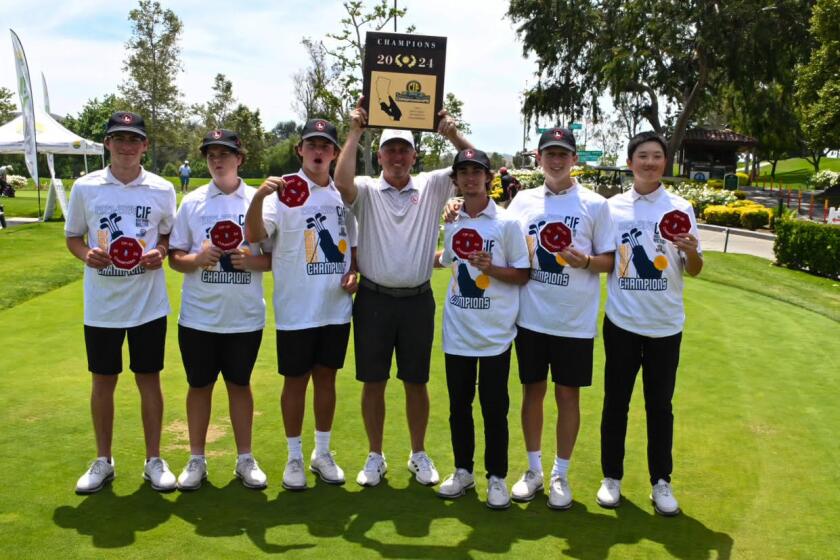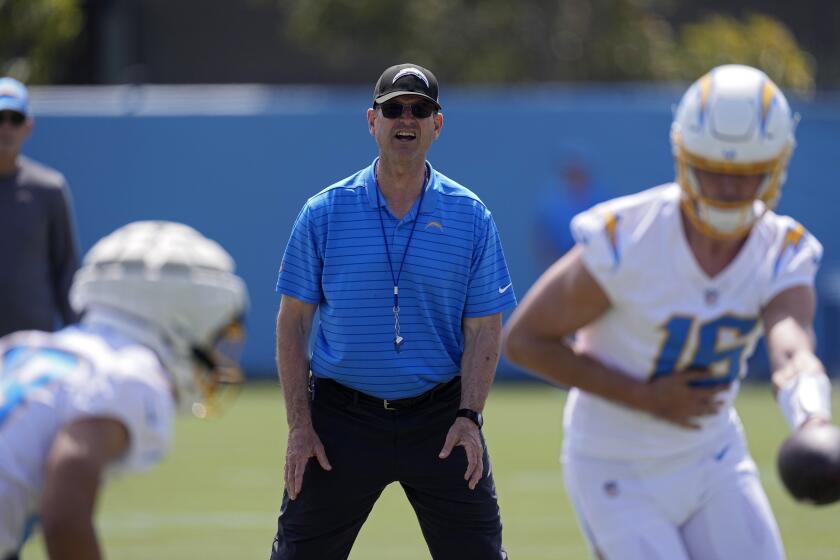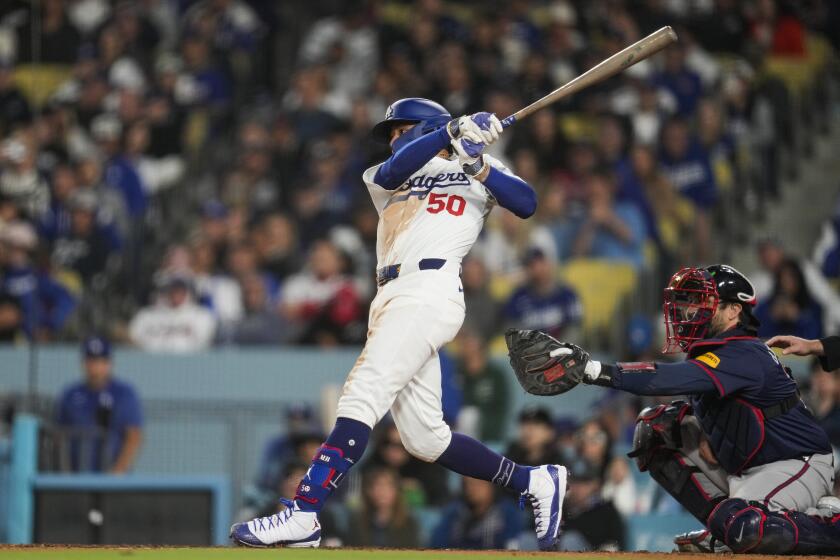No Changing Team Tabloid : Mets Brought in Torborg for Stability, but Off-the-Field Events Have Dominated
Jeff Torborg, to use his words, isn’t promising a rose garden. Good thing. The New York Mets hardly resemble an American Beauty.
With all of the new manager’s emphasis on family and togetherness, with all of the winter changes aimed at bringing in leadership as well as talent, with all of their conviction that the Club Met atmosphere of the last two years is history, the team’s camp is suddenly a weed patch of questions and distractions that won’t soon go away.
Indeed, if “Hardball Is Back,” as the Mets’ publicity department is hyping the 1992 season, some unexpected people are playing it.
There is the distracting cloud of a rape allegation against three players.
There is an $8.1-million suit filed by three women against scheduled opening-day pitcher David Cone. The suit includes charges of slander and sexual harassment and claims that on two occasions Cone exposed himself, once in a bullpen bathroom at Shea Stadium.
So many attorneys, investigators and journalists have invaded the Met complex that clubhouse admission has been restricted to reporters who cover the team on a regular basis.
In addition, the 31 players still in the Mets’ major league camp voted Friday to stop speaking to all members of the media.
A statement posted by the players read in part: “We’ve been ripped apart as a family and we’re going to stand together as a family.”
Torborg said that the media has “raked the players over the coals” in the aftermath of the rape allegations and Cone suit. He said he supports the players but hopes they will eventually lift the code of silence.
Commissioner Fay Vincent agreed that the players have been “victimized,” but said they have an obligation to be accessible to the media and he hopes to meet with them soon.
“There’s going to be adversity and we are going to have to overcome that, whatever it is,” the besieged Torborg said. “My job is to keep this team focused and prepared on the field. With the talent I see, I feel we have a good chance to win.”
The off-season additions of Bobby Bonilla, Eddie Murray, Bret Saberhagen and Willie Randolph helped promote that feeling, along with a sense of new stability, but their potential leadership is obviously going to be tested.
The aforementioned distractions are only part of it. There are questions pertaining to the physical status of key players and the ability of others to make pivotal position changes.
Torborg, who gave up a new contract with a bona fide contender, the Chicago White Sox, to return to his New Jersey neighborhood with an even larger and longer contract, is too much a realist to promise that rose garden, but he does vow that:
--The Mets will know where he’s coming from.
--Attitude will be stressed and family is important.
At one point this spring, Torborg even said that inevitable controversies would be kept in house and out of the tabloids, but that has since proved to be wishful thinking.
“I was nurtured on it with the Dodgers,” former catcher Torborg said of the family concept. “It’s the only way I know. I’m going to hit them over the head with attitude every day, every week.
“I believe in it. I’ve never been on a winning team that didn’t pull together, believe in family. I don’t care how old you are. I’m going with the same approach as when I had the White Sox and they were the youngest team in baseball.”
Despite the new congestion and restrictions, children of players roam the clubhouse. Wives will be allowed on certain trips during the season. The Mets have already had one spring picnic, not to mention numerous team meetings.
Civil and criminal investigations are beyond his control, of course, but Torborg hopes to prevent problems from festering, splintering the clubhouse as they did during the second half of last season.
The Mets were reminded of where he is coming from during the opening week of spring training after an anonymous player was quoted in a New York newspaper as saying that workouts were too long.
Torborg held a team meeting and asked if the anonymous player had anything to say to his face. There was no response, and Torborg said any future criticism is to be addressed in his office and kept in the family.
“I don’t think Jeff is the type guy who is going to say something and not enforce it,” said third baseman Dave Magadan before the players invoked their current ban. “Buddy (Harrelson, the fired 1991 manager) wanted discipline and ran a tight ship, but when the season fell apart in the second half that discipline went out the window.
“We’re old enough and make enough (money) to know what we have to do, but sometimes you
give someone an inch and he takes a mile.”
In his first full season as Davey Johnson’s successor, Harrelson had the Mets 2 1/2 games back of the Pittsburgh Pirates on July 13, only to go 28-50 in the remainder of the season and finish fifth, 20 1/2 games behind. The team was next-to-last in the National League in both batting and fielding.
“You hear about teams coming together like Minnesota did last year; well, the Mets went the other way,” said pitcher Ron Darling, now with the Oakland Athletics.
Injuries to Dwight Gooden and Vince Coleman were critical, but breakdowns in clubhouse attitude and respect for Harrelson were fatal.
The manager came under scrutiny in almost every area--strategy, discipline, authority and courage. Players suspected that coach Doc Edwards was running the team, and Harrelson was booed so heatedly at Shea Stadium during the second half of the season that he stopped making trips to the mound.
In the clubhouse, said Howard Johnson, who hit 38 home runs and drove in 117 runs as one of the few Mets who retained his concentration, there was back-stabbing, individualistic thinking and cliques.
“The writers didn’t have to write about the games, only what this player said about that player,” Johnson said. “Of course, there were never any names mentioned, it was always anonymous.”
Said Al Harazin, the Mets’ new general manager: “It was a shock to see a team that we felt was capable of winning fall apart to that degree. The last two or three months were like getting a pie in the face, but in retrospect it may have been the best thing that happened, since it confirmed our feelings that we had to retool, we had to make changes.”
Said Cone, before the filing of the suit against him: “I’m sure that an empty Shea Stadium in August and September provided a wake-up call for the front office, but it still took guts to make the wholesale changes they did.
“The important thing is that they not only improved the product on the field, but the clubhouse chemistry as well. No one stepped forward to deal with a losing situation last year, but there’s no lack of leadership now.”
In every move, Harazin said, from the pursuit of Torborg to the expensive signings of free agents Bonilla, Murray and Randolph to the trade for Saberhagen and Bill Pecota, character was almost as important as talent.
“We wanted strong individuals who command respect in the clubhouse and who could handle New York and the unique pressure from media and fans there,” Harazin said.
In some cases, the process came down to addition by subtraction.
Frank Viola was allowed to leave as a free agent after going 2-8 in August and September. His focus and fortitude were questioned by teammates who thought he was a whiner because of his frequent complaints about lack of support.
Gregg Jefferies, whose erratic glovework often raised the ire of teammates and was resented by those who perceived him to be the pampered prodigal, was packaged with Keith Miller and Kevin McReynolds, whose suspect work ethic is known to have disturbed Met management, in the deal for Saberhagen and Pecota.
In late March, separated from the disintegration of 1991 by time and distance, no one speaks ill of the departed, but enthusiasm for the new Mets, including Torborg, is a statement in itself.
“Jeff has already opened eyes with his no-nonsense meetings,” Cone said. “He set a tone from the first day.”
It was the same tone he set with the White Sox, who finished seventh in his first season, then second in his next two, as a series of No. 1 draft choices--Jack McDowell (1987), Robin Ventura (1988), Frank Thomas (1989) and Alex Fernandez (1990)--quickly provided a rebuilt foundation under General Manager Larry Himes, now with the Chicago Cubs.
Torborg preached the family concept and may have set a league record for meetings in his emphasis on detail and organization. It is customary to go over the opposing team before the start of each series. Torborg and staff conduct offensive, defensive and pitching meetings before every game, making use of a computer program designed by his former Dodger teammate, Joe Moeller, and which the Mets, at Torborg’s insistence, have purchased at a start-up cost of about $50,000.
On the bench during a game, Torborg often consults a mini-library of statistical material produced by the computer.
“People talk about managing from the gut, which I still do, but everyone needs a little help at times, and this provides a frame of reference,” he said. “There are two areas a manager can control, and that’s physical and mental preparation.
“We’re going to be as well prepared as any team in the National League.”
In September, soon after extending his Chicago contract through 1994 at an estimated $350,000 a year, the White Sox gave the Mets permission to talk with Torborg.
“I didn’t know Jeff that well, but every time I had been around him in trade talks at the winter meetings or other occasions, I had been impressed,” Harazin said.
“We heard good things about him as a manager and human being. I mean, every time we talked to American League people about the managers in that league, the two names always mentioned were Jeff’s and Tony La Russa’s.
“We knew (Jeff) to be a strong individual who had lived in the New York area all his life, was familiar with the pressures there and had demonstrated he could handle tough situations as a coach with the (New York) Yankees (and the one constant under George Steinbrenner from 1979 through ‘88).”
Torborg cited the chance to work at home (he lives in Mountainside, N.J.); the positive things he had heard about the organization and from the organization about its commitment to bring in quality players at almost any cost, and the offer of a four-year contract at a reported $500,000 a year.
As the Mets approach the season and Torborg continues to emphasize family and attitude, several questions remain unanswered.
--Can Johnson, the former third baseman and shortstop, make the transition to center field, demanding in itself and more so with Coleman on his left and Bonilla on his right?
--Will Gooden, pitching surprisingly well after having arthroscopic surgery for a rotator cuff tear in September, be able to take a regular turn? Torborg said there is no pressure, that Gooden will follow his own timetable, tentatively starting the second game of the season as part of a strong rotation that includes Gooden, Saberhagen, Cone, Sid Fernandez and Anthony Young.
--Is Todd Hundley, 22, ready to become the full-time catcher?
--Has shortstop Kevin Elster recovered sufficiently from rotator cuff surgery so that the versatile Pecota can be more of a swingman with Randolph at second and Magadan at third?
--Can Magadan return to his original position after several seasons at first base?
Then, of course, there’s the rape allegation against the three Met players plus the suit against Cone, serious distractions that could create media confrontations for the Mets in every city throughout the season.
Public relations director Jay Horwitz said he is receiving an extra 40 to 50 calls a day. Tensions are high as news reporters mingle with sportswriters at the Met camp, creating traffic jams near the batting cage and the entrance to the clubhouse.
The Port St. Lucie Police Dept. is investigating the complaint against the three players. A civil suit is possible even if criminal charges aren’t filed. Given the judicial process, the players could be involved in litigation for more than a year.
The Mets guaranteed Bonilla $29.5 million and Murray $7.5 million. They have a payroll of more than $40 million a year, but their comparably high hopes could unravel over events that have nothing to do with playing the game.
Harazin doesn’t think so. He says that he has brought in the right manager and the right caliber of players, though he, too, can only ask questions about this seemingly troubled family.
As he put it: “I still don’t think there’s any question we’re going to have a good year, but the question is, how good? We have the ability to win, but will we?”
More to Read
Get our high school sports newsletter
Prep Rally is devoted to the SoCal high school sports experience, bringing you scores, stories and a behind-the-scenes look at what makes prep sports so popular.
You may occasionally receive promotional content from the Los Angeles Times.






